
Exposé Online
What's old
Exposé print issues (1993-2011)
- 1 (October 1993)
- 2 (February 1994)
- 3 (May 1994)
- 4 (August 1994)
- 5 (October 1994)
- 6 (March 1995)
- 7 (July 1995)
- 8 (November 1995)
- 9 (March 1996)
- 10 (August 1996)
- 11 (February 1997)
- 12 (May 1997)
- 13 (October 1997)
- 14 (February 1998)
- 15 (July 1998)
- 16 (January 1999)
- 17 (April 1999)
- 18 (November 1999)
- 19 (May 2000)
- 20 (October 2000)
- 21 (March 2001)
- 22 (July 2001)
- 23 (December 2001)
- 24 (April 2002)
- 25 (September 2002)
- 26 (February 2003)
- 27 (August 2003)
- 28 (December 2003)
- 29 (April 2004)
- 30 (September 2004)
- 31 (March 2005)
- 32 (September 2005)
- 33 (May 2006)
- 34 (March 2007)
- 35 (January 2008)
- 36 (October 2008)
- 37 (July 2009)
- 38 (July 2010)
- 39 (Summer 2011)
Features
Inside the Bands Don’t Run on Time —
Modern Sky Festival Seattle 2015
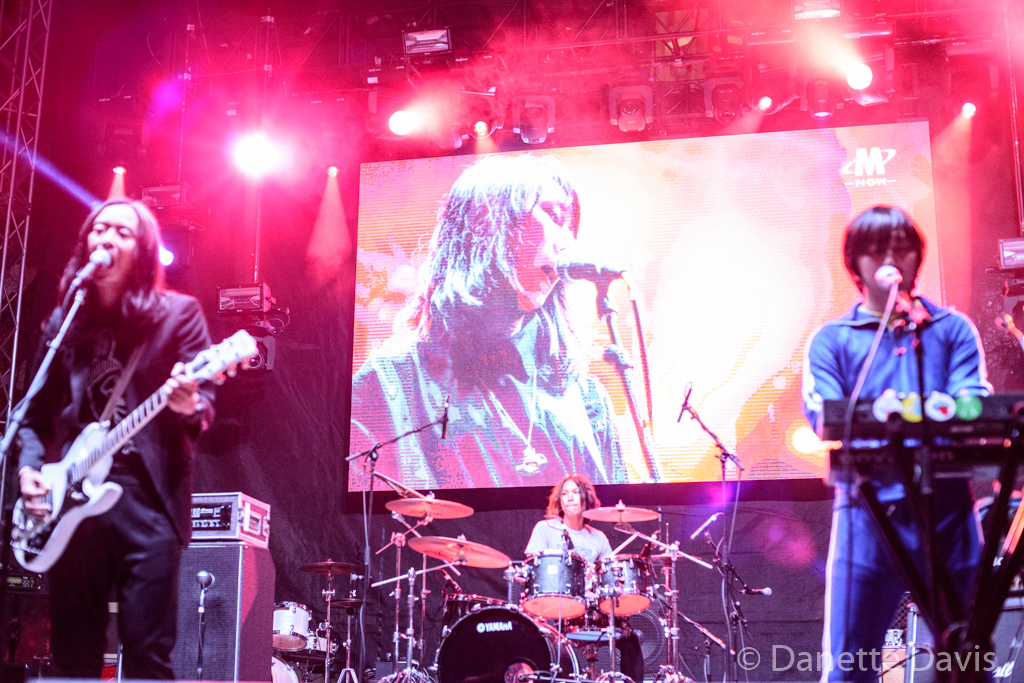
In China every year, big holiday music festivals are a staple of the entertainment industry, and Modern Sky is one of the primary producers of these festivals. Modern Sky is also a record label, but the festivals range far beyond the label’s own artists. Given the miniscule percentage of Chinese people who go to see live music in bars, the festivals are the primary way for bands to connect with fans. To Modern Sky’s credit, their events are eclectic affairs, featuring both well-known and obscure Chinese artists along with a wide variety of foreign acts. Genres represented range widely as well: heavy metal, punk, pop, singer-songwriters, post-rock, hip-hop, electronic, even quirky avant-garde.
by Jon Davis, Published 2015-10-16
photography by Danette Davis
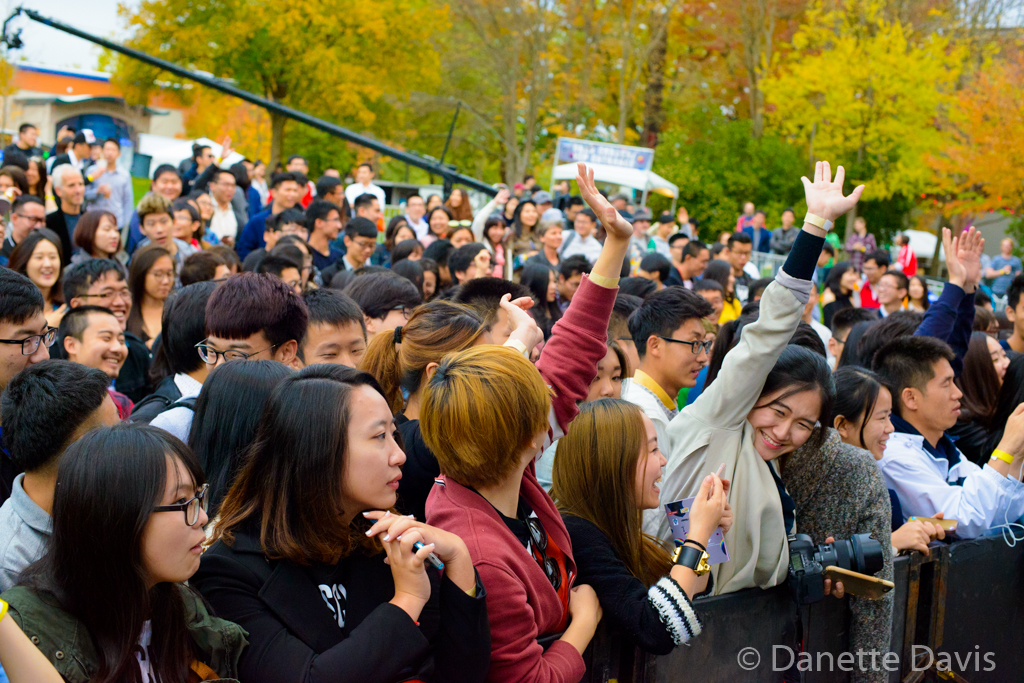
These festivals mostly occur at the big holiday weeks in China – the first week of May (Labor Day) and the first week of October (National Day), with Spring Festival (Chinese New Year) being too cold for an outdoor event, and everyone goes to temple fairs at that time anyway. They’re massive affairs on a scale that maybe only China could produce, with multiple stages presenting music from before noon until late at night, and there are vendors of all kinds, including cheap eats and ridiculously inexpensive alcohol.
In 2014, Modern Sky started expanding their scope outside of China with an event in New York City, and for 2015, they added Los Angeles and Seattle, as well as an event in Helsinki, Finland. When the Seattle show was first announced, I was happy to see Hedgehog on the bill, as they’re a band I really like, but unfortunately an illness prevented them from appearing. That left Miserable Faith and New Pants, two other Chinese bands I was familiar with and like, with the headliner being art-punk innovators Gang of Four – an interesting choice given the original meaning of the band’s name. The date was to be Sunday, October 11, 2015.
Staging an outdoor festival in Seattle in October is a risky move, and in the week leading up to the show, it wasn’t looking promising. The day before saw 35-mile-an-hour winds and record-setting rainfall, but Sunday dawned relatively clear, and the forecast called for the precipitation to hold off. The Mural Amphitheater is fairly nice as outdoor settings go, with a raised stage surrounded by a sloping grassy half-bowl, all in the shadow of the Space Needle. The grass was still wet from the previous day’s rain, but free seat-pads were available at the gate. According to the printed schedule, there was supposed to be a band called Mushroom Bunnies and Friends at 1:00, but that hour passed and we saw nothing on stage.
Mirel Wagner
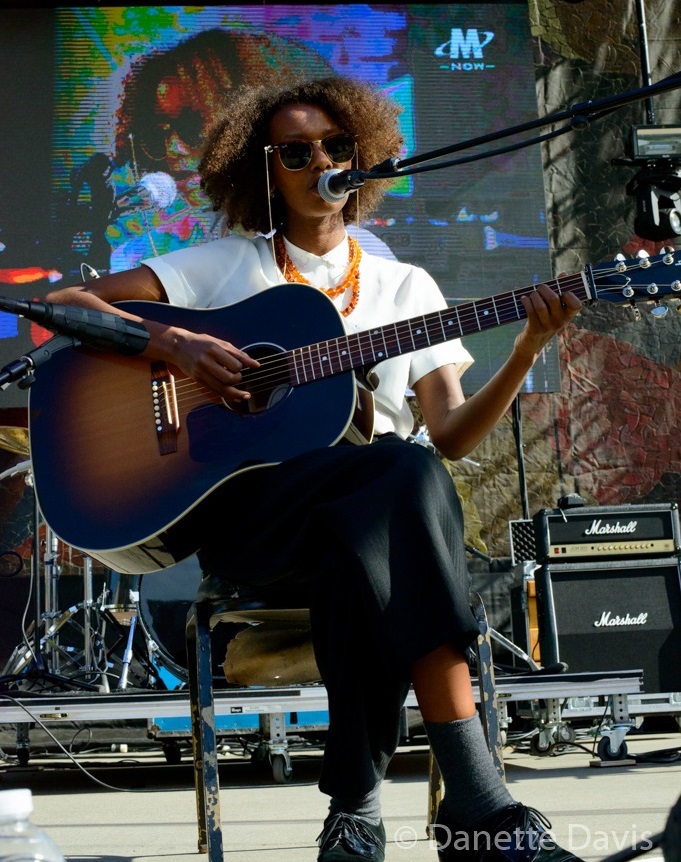 At about 1:30 or so, I was standing on the grass talking to a young guy who was there to write a piece for a student newspaper. He was Chinese-born, but had been in the US for several years, and confessed to not really understanding anything about rock music. We heard an acoustic guitar on stage, and I figured it was the first artist’s soundcheck, but then we heard a woman’s voice singing, and it became apparent that the show had started. The had been no announcement or anything, just a solitary woman sitting on a chair in the middle of a big stage with her guitar, singing in a soft voice. Mirel Wagner has an interesting story: born in Ethiopia, adopted as an infant to Finland, which she considers her home. Her lyrics are all in English, however, and the songs, while mostly adhering to singer-songwriter standards, are well-written, and have some really good turns of phrase in the words. Her voice is soft and pleasant, and she doesn’t really have a noticeable accent when singing. The only real drawback to the performance was her almost total avoidance of interaction with the audience, only speaking a couple of times, leaving some awkward silences between songs while she tuned up or switched to an alternate tuning. Then, as abruptly as she had started, she was done, thanked the audience and left the stage. She records for SubPop, an example of their stylistic diversification beyond rock music.
At about 1:30 or so, I was standing on the grass talking to a young guy who was there to write a piece for a student newspaper. He was Chinese-born, but had been in the US for several years, and confessed to not really understanding anything about rock music. We heard an acoustic guitar on stage, and I figured it was the first artist’s soundcheck, but then we heard a woman’s voice singing, and it became apparent that the show had started. The had been no announcement or anything, just a solitary woman sitting on a chair in the middle of a big stage with her guitar, singing in a soft voice. Mirel Wagner has an interesting story: born in Ethiopia, adopted as an infant to Finland, which she considers her home. Her lyrics are all in English, however, and the songs, while mostly adhering to singer-songwriter standards, are well-written, and have some really good turns of phrase in the words. Her voice is soft and pleasant, and she doesn’t really have a noticeable accent when singing. The only real drawback to the performance was her almost total avoidance of interaction with the audience, only speaking a couple of times, leaving some awkward silences between songs while she tuned up or switched to an alternate tuning. Then, as abruptly as she had started, she was done, thanked the audience and left the stage. She records for SubPop, an example of their stylistic diversification beyond rock music.
Ariel Pink’s Haunted Grafitti
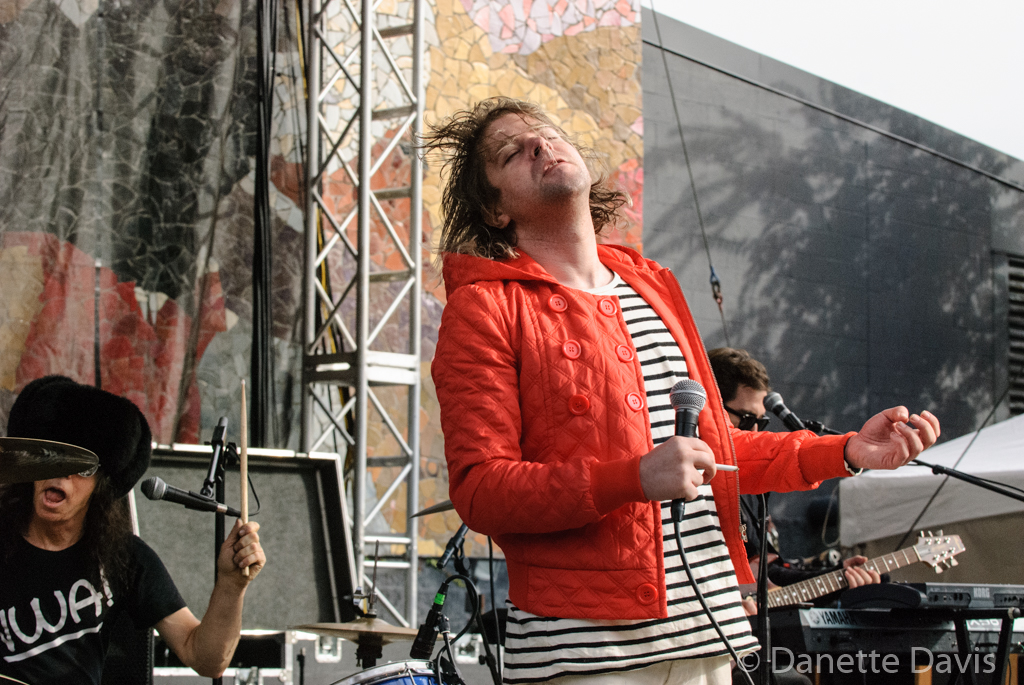 This is where things started going wrong. As soon as Mirel Wagner had left the stage, the crew started bringing out Ariel Pink’s gear, and some of the band members came out to do a brief soundcheck. Then they left the stage and we waited. And waited. It came to be the time when they were supposed to start, and we could see some of the band hanging out at the side of the stage. They seemed unhappy. The technical crew were waiting as well, so it didn’t seem to be a technical problem. We waited some more. There were no announcements from the stage. We waited a bit longer. According to the schedule, they should have been finishing up their set, and finally, Ariel himself appeared. I’d like to say it was worth the wait, but their attempt at edgy avant-rock was bumbling and annoying, with atonal swooping noises from the synthesizer while the drums pounded out a caveman beat and the guitars fiddled with effects. Pink staggered around on stage, swallowing his microphone and making belching noises which were treated to cavernous echoes. After ten minutes or so of that, they played something that resembled a song, but between his near-atonal singing, the thudding drums, and the overdone mess of guitars and keyboards, there was little to hold interest. Over the years, I’ve listened to a lot of avant-rock music, and some of it is among my favorite listening, but this was mostly just unpleasant. From appearances, I’d guess that Pink took advantage of Washington State’s legalized recreational marijuana (or something) – his between-song banter was mumbled and didn’t make much sense.
This is where things started going wrong. As soon as Mirel Wagner had left the stage, the crew started bringing out Ariel Pink’s gear, and some of the band members came out to do a brief soundcheck. Then they left the stage and we waited. And waited. It came to be the time when they were supposed to start, and we could see some of the band hanging out at the side of the stage. They seemed unhappy. The technical crew were waiting as well, so it didn’t seem to be a technical problem. We waited some more. There were no announcements from the stage. We waited a bit longer. According to the schedule, they should have been finishing up their set, and finally, Ariel himself appeared. I’d like to say it was worth the wait, but their attempt at edgy avant-rock was bumbling and annoying, with atonal swooping noises from the synthesizer while the drums pounded out a caveman beat and the guitars fiddled with effects. Pink staggered around on stage, swallowing his microphone and making belching noises which were treated to cavernous echoes. After ten minutes or so of that, they played something that resembled a song, but between his near-atonal singing, the thudding drums, and the overdone mess of guitars and keyboards, there was little to hold interest. Over the years, I’ve listened to a lot of avant-rock music, and some of it is among my favorite listening, but this was mostly just unpleasant. From appearances, I’d guess that Pink took advantage of Washington State’s legalized recreational marijuana (or something) – his between-song banter was mumbled and didn’t make much sense.
Miserable Faith
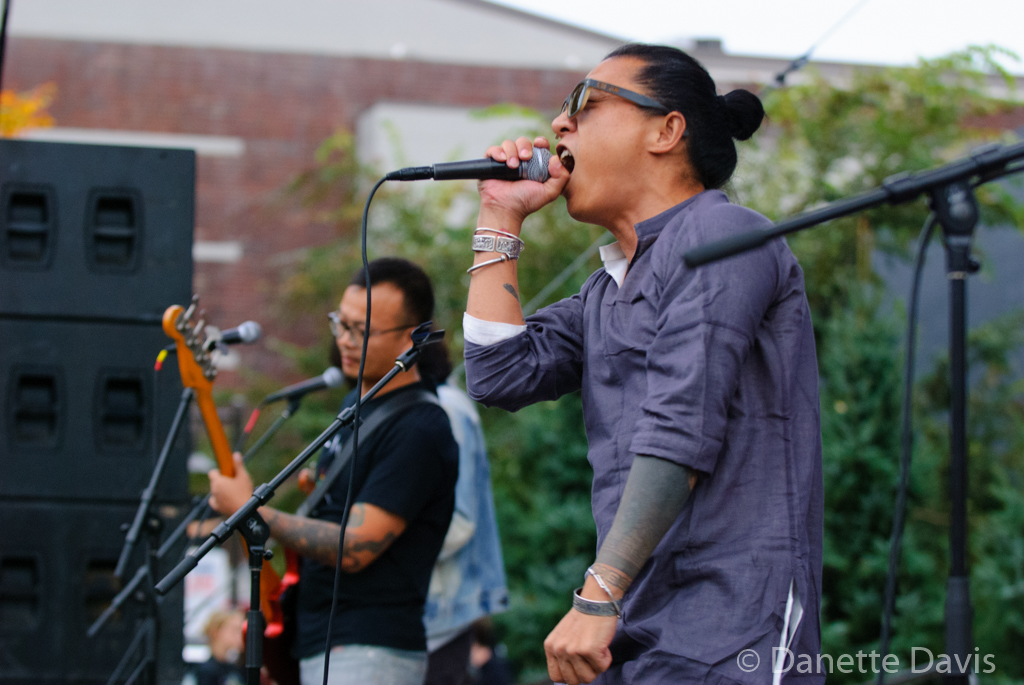
The first Chinese band on the bill was Miserable Faith, whose music I was already familiar with. By this time, more than a half hour behind schedule, the audience had swelled considerably, and consisted of three quarters or more Chinese – Modern Sky has a long way to go in their quest to bring Chinese rock to American audiences. Miserable Faith started out as a hardcore metal band influenced by Rage Against the Machine and the like, but over their more than ten-year history have moved into much more heavily acoustic sounds, folk-based and with more traditional Chinese elements. They’d already had a thorough soundcheck before the gates opened, so they were ready to go on short order. Their set relied heavily on their 2008 album The Music Won’t Be Stopped, with most of the remainder from their newest, May Love Be without Worries. 2008 was a transitional year for them, with some remnants of the heavy rock sound, so there was a good balance between softer tunes (often with a kind of reggae rhythm to them) and killer riffs. The crowd was really enjoying it, singing along with a lot of the songs. But the day’s schedule was pretty well shot by Ariel Pink’s tardiness, and much too soon, the PA was suddenly cut off. The band had obviously been planning more music, and we could see some discussion on stage. Then lead singer Gao Hu angrily unplugged his acoustic guitar and stalked off the stage. The rest of the band followed, as the audience chanted “Xi Hu! Xi Hu!” – the name of one of the band’s best known songs. But it was not to be. As the next band’s gear was being loaded onto the stage, we saw the members of Miserable Faith heading for the exit, and a knot of fans headed out to greet them.
The Black Lips
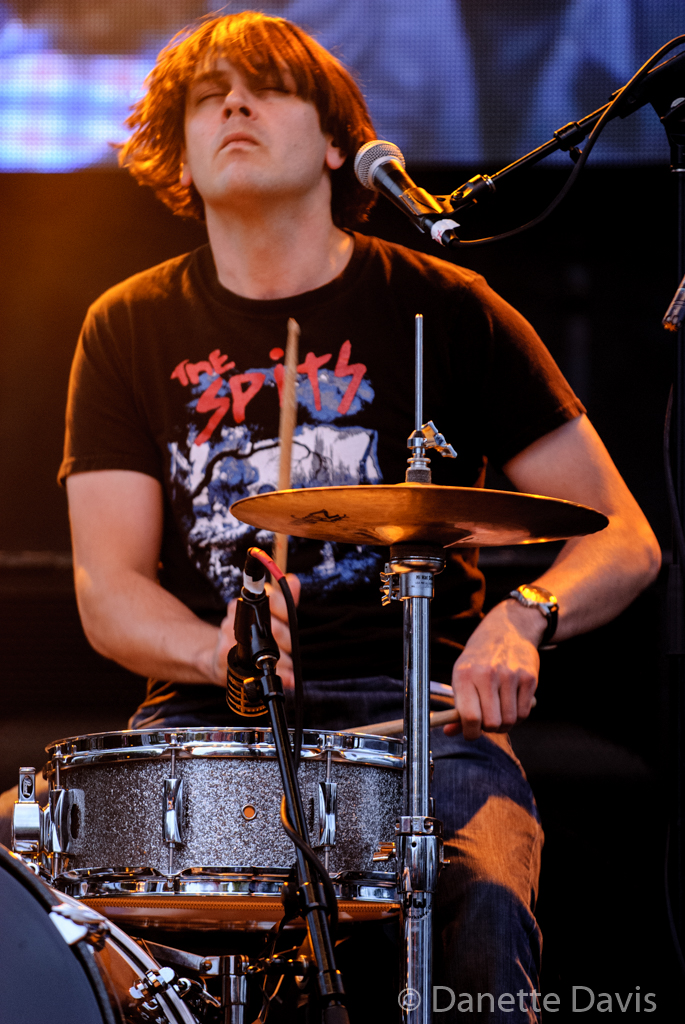
This Atlanta band fits firmly in a genre I (as a musician) think of as “rock you can play while sloppy drunk,” and by all appearances, that’s exactly how they were playing it. Stylistically, it’s your basic Ramones with a bit of Replacements thrown in, and a slight Southern accent. All four of the band members sang lead at various times, but the drummer was the only one who stayed on key; the woman who joined them on a few numbers playing saxophone made no audible contribution, but that might have been the fault of the mixing engineer. Their between-song banter was slurred and nearly incoherent. They mainly struck me as a band that’s at home in dive bars and frat parties but is nowhere near the level of professionalism called for on a large festival stage. On the other hand, much of the audience seemed to enjoy them, though the applause could have been sheer politeness, or even egging them on to make even bigger fools of themselves. But even a train wreck has a certain fascination, and I’m aware that different listeners have different standards. To step up onto a soapbox for a moment, any artist, regardless of style, owes it to their audience and the people they work with to be ready on time, to be in a condition that can present a good performance, and to treat both audience and venue staff with respect. There’s nothing wrong with a bit of alcohol or something to loosen up, but you have to know your limits.From what I’ve read of their reputation, we’re lucky they weren’t even worse.
Song Dongye
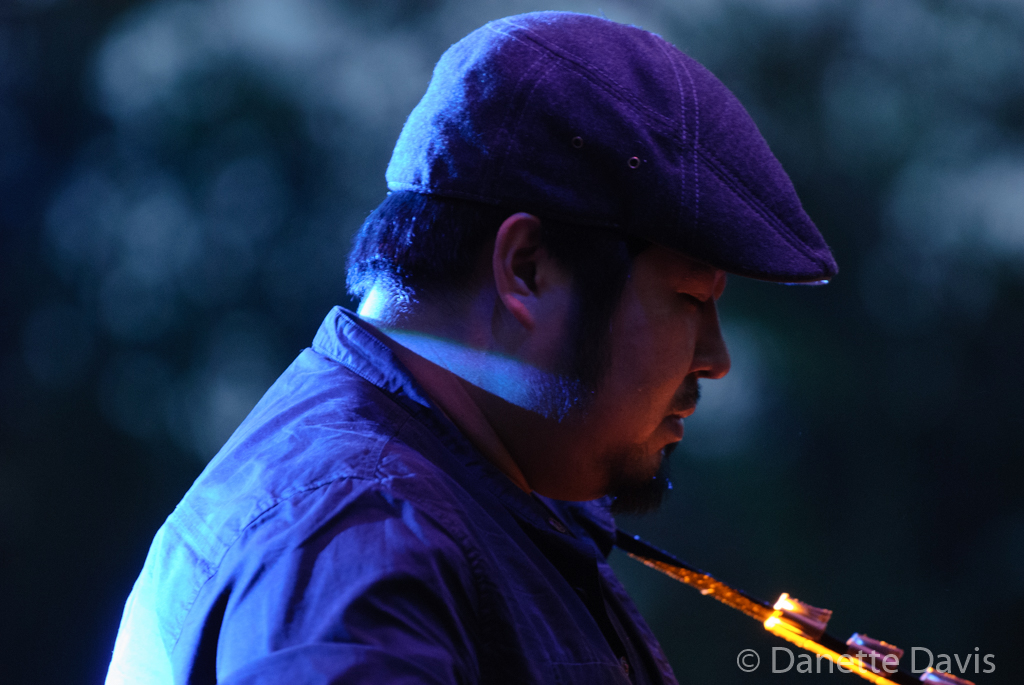 Song Dongye is another solo acoustic performer, but he couldn’t be more different from Mirel Wagner. He stood and seemed at ease with the audience, chatting with audience members in Chinese. I couldn’t catch much of it, but I’m pretty sure he made some kind of joke about how terrible his English was. His guitar playing was adventurous without being especially technical, and some of his parts involve unusual methods. His singing too was unconventional, with some excursions into falsetto and taking on different tones. The thing I noticed most was that the crowd, which was at its largest size of the day, was silently rapt while he sang, occasionally laughing at amusing lyrics or singing along. He rose to fame a few years ago when a song he wrote was performed by a contestant on a national singing contest TV show, and when he sang that tune, “Miss Dong,” you could hear a large portion of the audience singing along. I don’t think I’m making an unfair generalization by saying that the Chinese music industry consists largely of sentimental ballads and love songs, and “Miss Dong” hit that nerve perfectly. For a relative newcomer to the music big-time, he was relaxed on stage, very natural and charming.
Song Dongye is another solo acoustic performer, but he couldn’t be more different from Mirel Wagner. He stood and seemed at ease with the audience, chatting with audience members in Chinese. I couldn’t catch much of it, but I’m pretty sure he made some kind of joke about how terrible his English was. His guitar playing was adventurous without being especially technical, and some of his parts involve unusual methods. His singing too was unconventional, with some excursions into falsetto and taking on different tones. The thing I noticed most was that the crowd, which was at its largest size of the day, was silently rapt while he sang, occasionally laughing at amusing lyrics or singing along. He rose to fame a few years ago when a song he wrote was performed by a contestant on a national singing contest TV show, and when he sang that tune, “Miss Dong,” you could hear a large portion of the audience singing along. I don’t think I’m making an unfair generalization by saying that the Chinese music industry consists largely of sentimental ballads and love songs, and “Miss Dong” hit that nerve perfectly. For a relative newcomer to the music big-time, he was relaxed on stage, very natural and charming.
New Pants
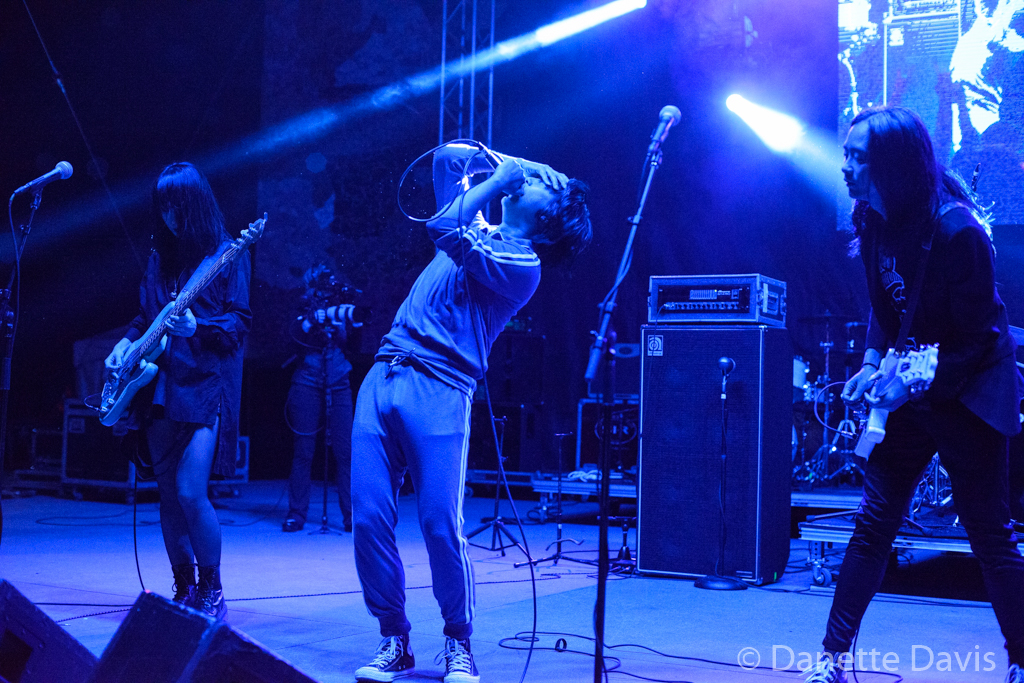
With a name like New Pants, you’d probably guess that heavy social commentary is not on the agenda, and you’d be right. There is social commentary, but it’s light-hearted and done with a catchy New Wave dance beat and a sense of humor. Drummer Kito Hayato played along with programmed backing on most of the songs, sometimes drum machine parts (with and without synthesizers), sometimes strummed acoustic guitars, but was endlessly entertaining, at one point standing on top of the kit reaching down to play the cymbals. Lead vocals are split more of less evenly between guitarist Peng Lei and keyboardist Pang Kuan, with Pang in his track suit providing many amusing dance moves and other hyperactive antics, jumping off the stage, over the barrier, surfing the crowd, and dancing with audience members. Bassist Zhao Meng provided backing vocals, and occasional lead parts, with her sweet tone providing a good contrast with the other voices. For all their goofiness and messing around on stage, they never missed a cue, and had a great time joking in Chinese with the audience in between songs. This band has been around nearly 20 years, and they’re real pros, but are so natural on stage that they don’t seem to be performing, and still seem like enthusiastic teenagers. At this point I started to wonder if the festival organizers had deliberately chosen American bands that would make the Chinese bands look good by comparison.
Gang of Four
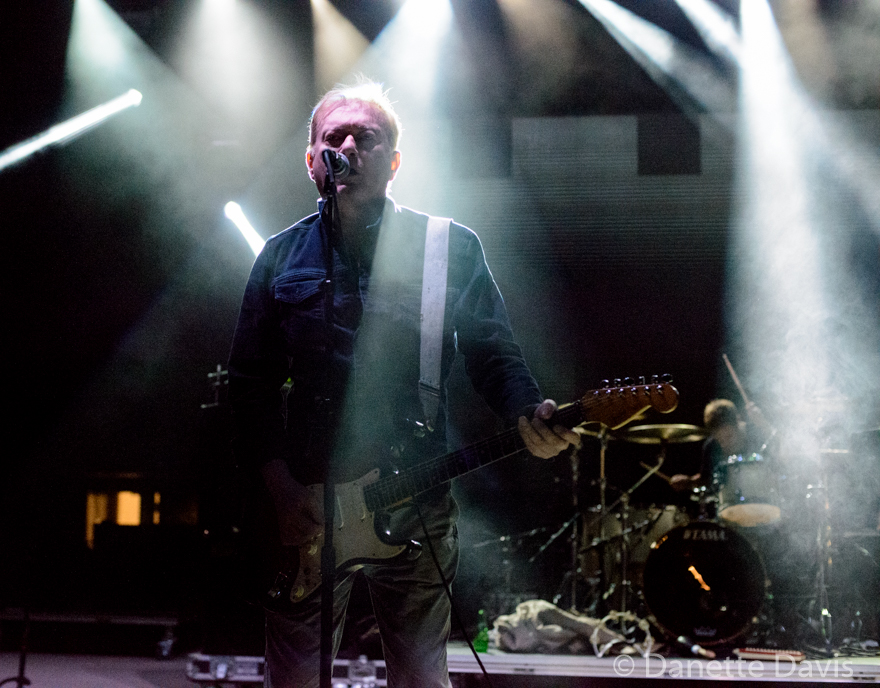
I’m not sure if it was because of Song Dongye and New Pants shortening their sets, but somehow, New Pants ended at about the time the schedule had called for, or even a little earlier, which left over a half hour of near silence before Gang of Four took the stage, much longer than the crew needed to get the setup done. A large portion of the audience had taken off as soon as New Pants was done, and as time dragged on, more and more slipped out. Finally, right on schedule, the current version of Gang of Four came out and provided a roaring finish to the festival. Only guitarist Andy Gill remains from the original band; the others have been with him only for the last few years. But current lead singer John Sterry sounds a bit like Jon King, and certainly has the right attitude to fit in. Gang of Four has always been largely about attitude, a kind of punkish, overdriven funk motivated by a distaste of materialism and other social ills. Bassist Thomas McNeice is a big factor in making it work, handling the iconic bass lines with every bit of the aggressive edge that made this music so groundbreaking in 1979. Gill’s crazed guitar parts are the other key, and at one point they were taken to their extreme when he unslung his guitar and positioned it at various places around the stage to alter the feedback. He propped it up against the front of the stage, and encouraged one of the photographers in the pit to play around with the whammy bar, making some wild swooping noises. Then he held it over his head and dropped it to the ground, where the feedback screeched on. Gill retreated to the amp and cut the volume for the song’s vocal parts, then turned it back up for the gap between verses. They hit upon many of their most famous tunes, with “To Hell with Poverty” being the highlight. In some ways, a purist might say that this was a Gang of Four tribute band with Andy Gill as a special star, but on a musical level, it worked admirably, and those who hung around for the finish got a great show.
.jpg) As someone who’s had a lot of experience attending music festivals, as well as a little experience running them, I’ve come to the conclusion that communication with the audience is very important. If things are running behind schedule, you should let people know. You don’t have to make excuses or lay blame, but at least tell the people who paid to be there what to expect. Given that Modern Sky Seattle had a radio station (KEXP) on their sponsor list, it’s a little odd that one of the station’s DJ’s wasn’t on hand to introduce bands and make other announcements. I listen to KEXP sometimes, but I never heard a single mention of the festival on the air. The established Modern Sky formula of combining artists from China with other countries is one that should work here, though it will have to be the non-Chinese artists who will bring in an audience beyond Chinese students and expatriates. Bands of the caliber represented by Ariel Pink and The Black Lips are unlikely to draw many fans, and Gang of Four by themselves couldn’t carry a whole day. For those who did attend, it was affirmation that China has bands worthy of ranking with the rest of the world. If done right, they should be able to refine their North American operation and produce a sustainable event.
As someone who’s had a lot of experience attending music festivals, as well as a little experience running them, I’ve come to the conclusion that communication with the audience is very important. If things are running behind schedule, you should let people know. You don’t have to make excuses or lay blame, but at least tell the people who paid to be there what to expect. Given that Modern Sky Seattle had a radio station (KEXP) on their sponsor list, it’s a little odd that one of the station’s DJ’s wasn’t on hand to introduce bands and make other announcements. I listen to KEXP sometimes, but I never heard a single mention of the festival on the air. The established Modern Sky formula of combining artists from China with other countries is one that should work here, though it will have to be the non-Chinese artists who will bring in an audience beyond Chinese students and expatriates. Bands of the caliber represented by Ariel Pink and The Black Lips are unlikely to draw many fans, and Gang of Four by themselves couldn’t carry a whole day. For those who did attend, it was affirmation that China has bands worthy of ranking with the rest of the world. If done right, they should be able to refine their North American operation and produce a sustainable event.
Check out some more pictures at www.danettedavis.com.
With the title of this article, I just couldn't resist a play on the Gang of Four song title "Outside the Trains Don't Run on Time," and I mean no offense or criticism, except as is obvious within my text.
Filed under: Festivals
Related artist(s): Miserable Faith
More info
http://modernskyfestivalseattle.com
What's new
These are the most recent changes made to artists, releases, and articles.
- Review: LeoNero - Monitor
Published 2026-03-04 - Review: Sterbus - Black and Gold
Published 2026-03-03 - Release: Janel Leppin's Ensemble Volcanic Ash - Pluto in Aquarius
Updated 2026-03-02 15:06:51 - Release: Janel Leppin - Slowly Melting
Updated 2026-03-02 15:05:27 - Release: Alister Spence - Always Ever
Updated 2026-03-02 15:04:11 - Release: Let Spin - I Am Alien
Updated 2026-03-02 15:02:41 - Review: Falter Bramnk - Vinyland Odyssee
Published 2026-03-02 - Review: Exit - Dove Va la Tua Strada?
Published 2026-03-01 - Review: Steve Tibbetts - Close
Published 2026-02-28 - Release: We Stood Like Kings - Pinocchio
Updated 2026-02-27 19:24:02 - Release: Stephen Grew - Pianoply
Updated 2026-02-27 19:20:11 - Release: Thierry Zaboitzeff - Artefacts
Updated 2026-02-27 00:16:46 - Review: Kevin Kastning - Codex I & Codex II
Published 2026-02-27 - Release: Zan Zone - The Rock Is Still Rollin'
Updated 2026-02-26 23:26:09 - Release: The Leemoo Gang - A Family Business
Updated 2026-02-26 23:07:29 - Release: Ciolkowska - Bomba Nastoyashchego
Updated 2026-02-26 13:08:55 - Review: Immensity Crumb - Chamber Music for Sleeping Giants
Published 2026-02-26 - Release: The Gatekeepers - Diary of a Teenage Prophet
Updated 2026-02-25 15:55:58 - Review: Mars Lasar - Grand Canyon
Published 2026-02-25
